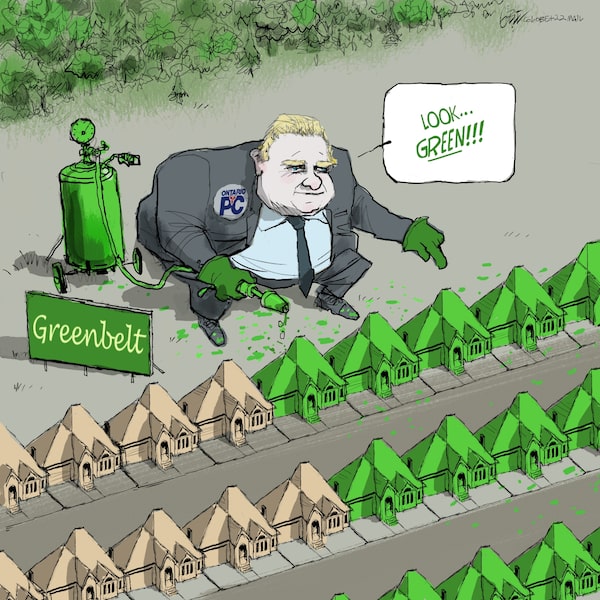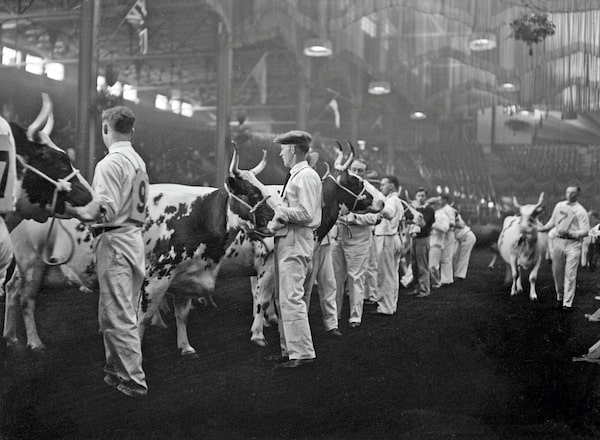Good morning,
The director of Canada’s spy agency advised Prime Minister Justin Trudeau to invoke the Emergencies Act to end last winter’s convoy protests, despite the fact that the blockades did not meet the CSIS definition of a national security threat outlined in the sweeping legislation.
The Emergencies Act was necessary, David Vigneault, the head of the Canadian Security Intelligence Service, told the inquiry studying the act’s use yesterday. He testified that he gave that advice after he was reassured by a Justice Department legal opinion that allowed for a broader interpretation of the definition that stipulated when the powerful legislation can be used.
That legal advice is central to the federal government’s justification for invoking the never-before-used act and is the inquiry’s focus as the commission enters a pivotal week.
- Campbell Clark: Convoy protests both a national security threat and not
- Shannon Proudfoot: Bill Blair and his two hats come to the commission
A person walks among trucks on Wellington Street during anti-government protests in Ottawa, on Monday, Feb. 14, 2022.Justin Tang/The Canadian Press
This is the daily Morning Update newsletter. If you’re reading this on the web, or it was forwarded to you from someone else, you can sign up for Morning Update and more than 20 other Globe newsletters on our newsletter signup page.
PM, ministers must not be exempt from transparency laws, former bureaucrat says
The offices of the prime minister and federal ministers should no longer be exempt from access-to-information law, Canada’s former top public servant says, and there should be a greater onus throughout the federal government to proactively disclose as much information to the public as possible.
Speaking to the House of Commons committee on access to information yesterday, Michael Wernick said public servants are already subject to access requests and that this should be expanded to include all “taxpayer funded political staff” including at the top levels of the federal government.
During the 2015 federal election campaign, Liberal Leader Justin Trudeau vowed to make sweeping changes to access to information, including bringing ministers’ offices – including his own – under the access regime. Ministers’ offices in many provinces are already covered by freedom-of-information laws. But when the Access to Information Act was amended in 2018, the changes did not bring federal ministers’ offices within the scope of the law.
Nunavut commits to greater transparency on TB outbreaks, but won’t make figures public
The government of Nunavut has agreed to share detailed data about the spread of tuberculosis with the territory’s top Inuit organization, but it won’t divulge those figures to the public as called for by Nunavut’s Information and Privacy Commissioner.
Nunavut continues to fight an outbreak of tuberculosis in Pangnirtung, a community of about 1,500 people on Baffin Island. More than 160 infections, 35 of them active cases that made patients sick and contagious, were diagnosed in the community between January of 2021 and August of this year. The outbreak is the worst to be publicly reported in Nunavut in at least five years.
Got a news tip that you’d like us to look into? E-mail us at tips@globeandmail.com Need to share documents securely? Reach out via SecureDrop
Also on our radar
Iranian World Cup squad declines to sing national anthem: Iran’s World Cup team declined to sing their national anthem before their opening World Cup match yesterday and players didn’t celebrate their goals in a show of support for mass protests back home. In the stands, many Iranian fans also showed solidarity with the protest movement that has roiled the country for months.
More of The Globe’s World Cup coverage:
- Wales kicks off its first World Cup in 64 years with draw against U.S.
- Cathal Kelly: Armband protest reversal at FIFA World Cup: Get praise for joining the fight – with no intention of taking a punch
- Cathal Kelly: Lionel Messi reaches crossroads in Qatar
- John Doyle: The Dutch are back, and thank heavens for that
Shaw has yet to recoup investment in Freedom Mobile, CFO says: Shaw Communications Inc. has not recouped the $4.5-billion it has invested in its wireless business since 2016, an executive for the Calgary-based telecom told a Competition Tribunal hearing into the proposed $26-billion merger of Rogers Communications Inc. and Shaw.
Probe urged into Canadian Tire’s ‘abuses’ at Bangladeshi factories: Labour groups are requesting a federal watchdog to investigate allegations that Canadian Tire pays “poverty-level wages” to workers at its factories in Bangladesh.
Burnout rises among academic physicians: Many academic physicians were already experiencing a state of emotional, mental or physical exhaustion before the pandemic. But as Canadian surveys conducted over the past few years have shown, burnout among this population of health professionals skyrocketed during the early waves of COVID-19. And some fear it will have lasting consequences for health care in this country.
Former Harper adviser denounces Poilievre drug policy: A former public safety and justice adviser to Conservative prime minister Stephen Harper says he is “disgusted” by current party leader Pierre Poilievre’s views on Vancouver’s toxic drug crisis, adding that they are “not informed by any research evidence or expertise.”
- John Ibbitson: Critics may scoff at Pierre Poilievre, but any politician opposing him should be concerned
B.C. legislation on personal wealth criticized by rights groups: British Columbia is set to introduce legislation that will make it easier for the state to seize assets from individuals who cannot sufficiently prove their source of wealth, in what a provincial civil liberties watchdog is calling an “unacceptable infringement” of Canadians’ Charter rights.
Morning markets
Global markets cautious: Global shares edged higher on Tuesday, recovering some of the previous day’s losses, as improved investor risk appetite drove flows into equities and commodities, although concern over more COVID infections in China tempered gains. Just before 6 a.m. ET, Britain’s FTSE 100 rose 0.80 per cent. Germany’s DAX and France’s CAC 40 were up 0.32 per cent and 0.15 per cent, respectively. In Asia, Japan’s Nikkei added 0.61 per cent while Hong Kong’s Hang Seng fell 1.31 per cent. New York futures were modestly positive. The Canadian dollar was higher at 74.61 US cents.
What everyone’s talking about
Editorial: “Ontario and B.C. are pointed in the right direction but their proposed measures are too timid. The housing market is a mess. Without stronger action, it’s going to get worse.”
Today’s editorial cartoon

Brian Gable/The Globe and Mail
Living better
Meat-free ways to boost your protein intake
If you’re making healthy changes to your diet by eating less meat and more plants, you might wonder whether you’re getting enough protein. Or, perhaps you worry that the protein in plants is inferior to that found in animal foods. The good news: There are plenty of plant foods that can shore up your daily protein intake.
Moment in time: Nov. 22, 1922

Judging cattle in ring, Royal Winter Fair, Toronto, November 20, 1930.John Boyd/The Globe and Mail
Opening day of first Royal Agricultural Winter Fair
In 1918, a group of farmers gathered in Toronto to discuss an idea. Agricultural fairs were happening all over the country. Ontario alone had several fairs every year. But there was no one national fair that could bring together farmers from all of the then-nine provinces to celebrate their best work – from the cattle and chicken they had raised, to the squash and vegetables they had grown. The group was led by William Arthur Dryden, a prominent cattle breeder from Brooklin, Ont., who quickly set out his vision for the fair. It would take place every November, strategically timing the event between the major livestock shows in New York and Chicago. And it would need a central location accessible to farmers from across the country. After the committee narrowed the choice down to Hamilton and Toronto, Dryden decided on the latter. The idea for the fair won support from all three levels of government, as well as King George V, who sanctioned the “Royal” moniker. The fair officially opened its gates on this day in 1922. In the first week alone, a reported 150,000 people visited, as well as 9,000 chickens, hens and turkeys; 2,500 cows; 1,850 horses, and 700 pigs. Ann Hui
Read today's horoscopes. Enjoy today's puzzles.
If you’d like to receive this newsletter by e-mail every weekday morning, go here to sign up. If you have any feedback, send us a note.